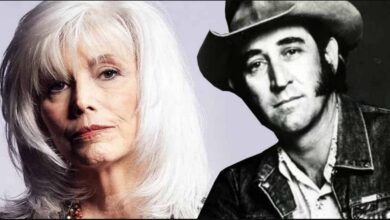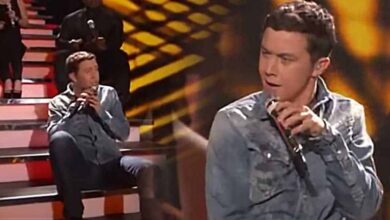His Voice Was Pained; He Passed Two Months Later, A Lion, Though Weakened
Johnny Cash’s final live performance, held on July 5, 2003, at the Carter Family Fold in Hiltons, Virginia, remains a poignant and powerful testament to his enduring influence on American music. Despite facing considerable health challenges, including significant vision impairment, physical frailty, and the recent loss of his beloved wife June Carter Cash, Cash’s dedication to his craft shone through in this memorable concert.
The performance, which began with Cash’s familiar greeting, “Hello, I’m Johnny Cash,” was supported by a small yet formidable band. His son, John Carter Cash, joined him on vocals, while Jerry Hensley played guitar and Bobby Starnes contributed on bass. The setlist featured many of Cash’s most iconic songs, including “Folsom Prison Blues,” “I Walk the Line,” “Ring of Fire,” “Big River,” and Kris Kristofferson’s “Sunday Mornin’ Comin’ Down.” Each song was delivered with the raw intensity and authenticity that characterized Cash’s storied career, reflecting his deep connection to his music.
A particularly touching moment occurred during Cash’s rendition of “Angel Band,” a song that Emmylou Harris had performed at June Carter Cash’s funeral. This performance was a heartfelt tribute to his late wife, highlighting the profound sense of loss and sorrow that Cash was enduring. Another significant highlight was Cash’s rendition of “Understand Your Man,” a song he had not performed in over two decades. This rare inclusion added a layer of nostalgia and reflection on his artistic journey and the passage of time.
Throughout the evening, Cash’s voice, though affected by age and illness, retained a profound emotional depth that resonated with the audience. His personal reflections on the presence of June’s spirit and the inspiration she provided created a deeply intimate connection between his life experiences and his music. This ability to weave personal emotion into his performances was a hallmark of Cash’s career and was particularly evident during this final concert.
Johnny Cash’s impact on American music was extensive and multifaceted. His ability to cross genre boundaries—from country to rock, folk, and gospel—demonstrated his versatility and profound influence on the music landscape. This final performance, despite the challenges Cash faced, served as a powerful reminder of his enduring legacy and the deep emotional resonance of his work. It was a fitting closure to a remarkable career, capturing the essence of a man who had, throughout his life, used his music to connect deeply with audiences and convey the full spectrum of human experience.





